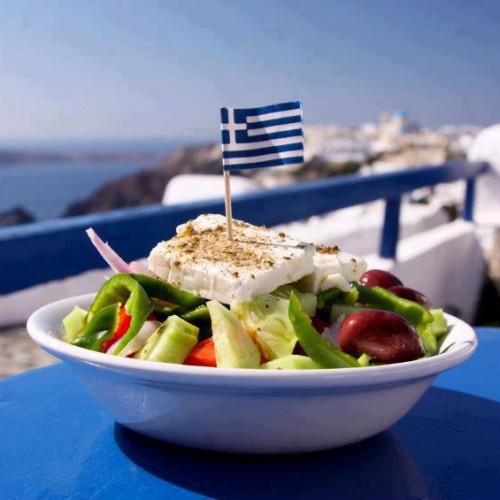
Greek Gastronomy
One of the authentic cultural elements of a region is gastronomy. The distinctiveness of the “kitchen taste” (gustation) is many times associated with the quality characteristics of its society, while “revealing” information concerning its cultural and economical history.
At the same time, gustation seems to be a way of communicating. A way for someone to “talk” to the heart of someone else.
Greek gastronomy has recorded a history of around 4,000 years, with especial characteristics based on pure and unique quality goods produced on Greek land. In fact, it was Archestratos who wrote the first cookbook in history (330 B.C.).
In Greek nutritional tradition the gustative result blends harmonically with the high nutritional value. Dozens of scientific studies have shown the positive effect of a balanced Greek diet on a person’s health, beauty and longevity. In addition, the nutritional culture of the Greeks has traditionally added an extraverted social dimension to the table, combining gustative satisfaction with recreation and communication, and thus maintaining even today some overtones from ancient feasts.
In contrast to what many people believe about Greek cuisine, you will discoverer that “moussaka”, “souvlaki” and “choriatiki” (Greek salad) are not the only worthwhile Greek dishes. Greek cuisine consists of a large variety of dishes that can fully satisfy the gastronomic quests of both vegetarians and meat lovers.
Basic ingredients
Greek cuisine has four secrets: good quality fresh ingredients, correct use of flavourings (herbs) and spices, the famous Greek olive oil and simplicity.
Greek olive oil deserves a special note. It accompanies almost all Greek dishes, it is used abundantly in most of them, it is of excellent quality and it is very good for your health. It is also known that artificial cultivation of vegetables is not carried out due to the mild Greek climate. Consequently, most vegetables are cultivated in natural ways and they therefore maintain their aroma and their flavour. You will be happy and content after tasting a Greek tomato, cabbage, carrot, onion, parsley and garlic. At the same time, you should not forget the rich flavour and aroma of fresh Greek fruits, such as grapes, apricots, peaches, cherries, melons, watermelons, etc.

As far as flavourings (herbs) are concerned, which almost every Greek gathers from the hills and the countryside, they are renowned for their gustativeness, aromas and curative properties. As you taste some of the many different dishes, you will be mesmerized by the amazing aroma of oregano, thyme, mint androsemary. Do not forget to also try the Greek cheeses, especially feta cheese. Taking as fact that the sheep and goats are free-ranging and the pastures are especially lush and green, Greek meat has a unique taste that cannot be compared. Mediterranean seafood is much tastier than those from the oceans. The Aegean and Ionian Seas are crystal clear and rich with fish. Fresh fish on the grill is considered to be a true delight.
Greek philosophy
The time of the day when Greeks gather around the table to enjoy a meal or various hors d’oeuvres (mezedes) with ouzo is a tradition that every Greek maintains with reverence. A deeply entrenched social custom is when Greeks share a meal with friends at home, in a restaurant or a tavern. The Greek word “symposium” -a word that is as old as Greece itself- literally means “drinking with friends”. The atmosphere in an ordinary Greek restaurant or tavern is relaxing, simple and informal. The preparation of the food on the other hand has its own sacred rules. Good amateur cooks are highly respected in their social circle, while a good housewife in Greece mainly signifies a good cook. And a good cook can spend days preparing a meal for his/her friends.

The atmosphere
Sip a glass of ouzo or wine with grilled octopus or any other Greek dish while sitting under the shade of a tree in a small tavern by the sea on an island in the Aegean. When you return home, try to repeat this experience by preparing the same meal and serving the same drink. Wherever you try to repeat this, you will soon realize that it does not taste the same. It’s not that something is wrong with your palate or your culinary skills; it’s that the Greek ritual when eating a meal –mainly a combination of what you are eating and where you are eating it- cannot be repeated, extracted or copied. It is simply something you can only find, taste and enjoy in Greece.








